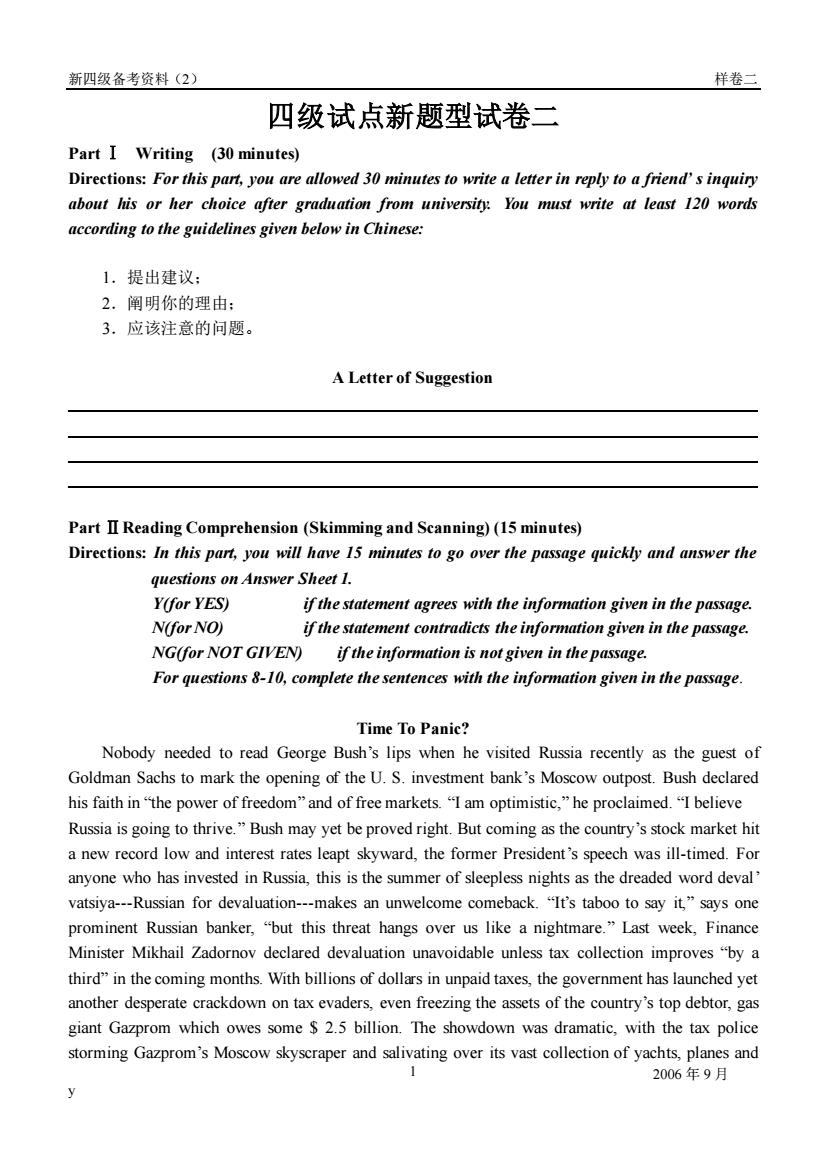
新四级备考资料(2) 样卷三 四级试点新题型试卷二 Part I Writing (30 minutes) Directions:For this part,you are allowed 30 minutes to write a letter in reply to a friend's inquiry about his or her choice after graduation from university:You must write at least 120 words according to the guidelines given below in Chinese: 1,提出建议: 2.阐明你的理由 3.应该注意的问题。 A Letter of Suggestion Part II Reading Comprehension(Skimming and Scanning)(15 minutes) Directions:In this part,you will have 15 minutes to go over the passage quickly and answer the questions on Answer Sheet 1. Y(for YES) if the statement agrees with the information given in the passage N(forNO) if the statement contradicts the information given in the passage. NG(for NOT GIVEN) if the information is not given in the passage. For questions 8-10,complete the sentences with the information given in the passage Time To Panic? Nobody needed to read George Bush's lips when he visited Russia recently as the guest of Goldman Sachs to mark the opening of the U.S.investment bank's Moscow outpost.Bush declared his faith in"the power of freedom"and of free markets."I am optimistic,"he proclaimed."I believe Russia is going to thrive."Bush may yet be proved right.But coming as the country's stock market hit a new record low and interest rates leapt skyward,the former President's speech was ill-timed.For anyone who has invested in Russia,this is the summer of sleepless nights as the dreaded word deval vatsiya-Russian for devaluation-makes an unwelcome comeback."It's taboo to say it"says one prominent Russian banker,"but this threat hangs over us like a nightmare."Last week,Finance Minister Mikhail Zadornov declared devaluation unavoidable unless tax collection improves "by a third"in the coming months.With billions of dollars in unpaid taxes,the government has launched yet another desperate crackdown on tax evaders.even freezing the assets of the country's top debtor.gas giant Gazprom which owes some $2.5 billion.The showdown was dramatic,with the tax police storming Gazprom's Moscow skyscraper and salivating over its vast collection of yachts,planes and 1 2006年9月
新四级备考资料(2) 样卷二 2006 年 9 月 y 1 四级试点新题型试卷二 Part Ⅰ Writing (30 minutes) Directions: For this part, you are allowed 30 minutes to write a letter in reply to a friend’ s inquiry about his or her choice after graduation from university. You must write at least 120 words according to the guidelines given below in Chinese: 1.提出建议; 2.阐明你的理由; 3.应该注意的问题。 A Letter of Suggestion _ _ _ _ Part ⅡReading Comprehension (Skimming and Scanning) (15 minutes) Directions: In this part, you will have 15 minutes to go over the passage quickly and answer the questions on Answer Sheet 1. Y(for YES) if the statement agrees with the information given in the passage. N(for NO) if the statement contradicts the information given in the passage. NG(for NOT GIVEN) if the information is not given in the passage. For questions 8-10, complete the sentences with the information given in the passage. Time To Panic? Nobody needed to read George Bush’s lips when he visited Russia recently as the guest of Goldman Sachs to mark the opening of the U. S. investment bank’s Moscow outpost. Bush declared his faith in “the power of freedom” and of free markets. “I am optimistic,” he proclaimed. “I believe Russia is going to thrive.” Bush may yet be proved right. But coming as the country’s stock market hit a new record low and interest rates leapt skyward, the former President’s speech was ill-timed. For anyone who has invested in Russia, this is the summer of sleepless nights as the dreaded word deval’ vatsiya-Russian for devaluation-makes an unwelcome comeback. “It’s taboo to say it,” says one prominent Russian banker, “but this threat hangs over us like a nightmare.” Last week, Finance Minister Mikhail Zadornov declared devaluation unavoidable unless tax collection improves “by a third” in the coming months. With billions of dollars in unpaid taxes, the government has launched yet another desperate crackdown on tax evaders, even freezing the assets of the country’s top debtor, gas giant Gazprom which owes some $ 2.5 billion. The showdown was dramatic, with the tax police storming Gazprom’s Moscow skyscraper and salivating over its vast collection of yachts, planes and
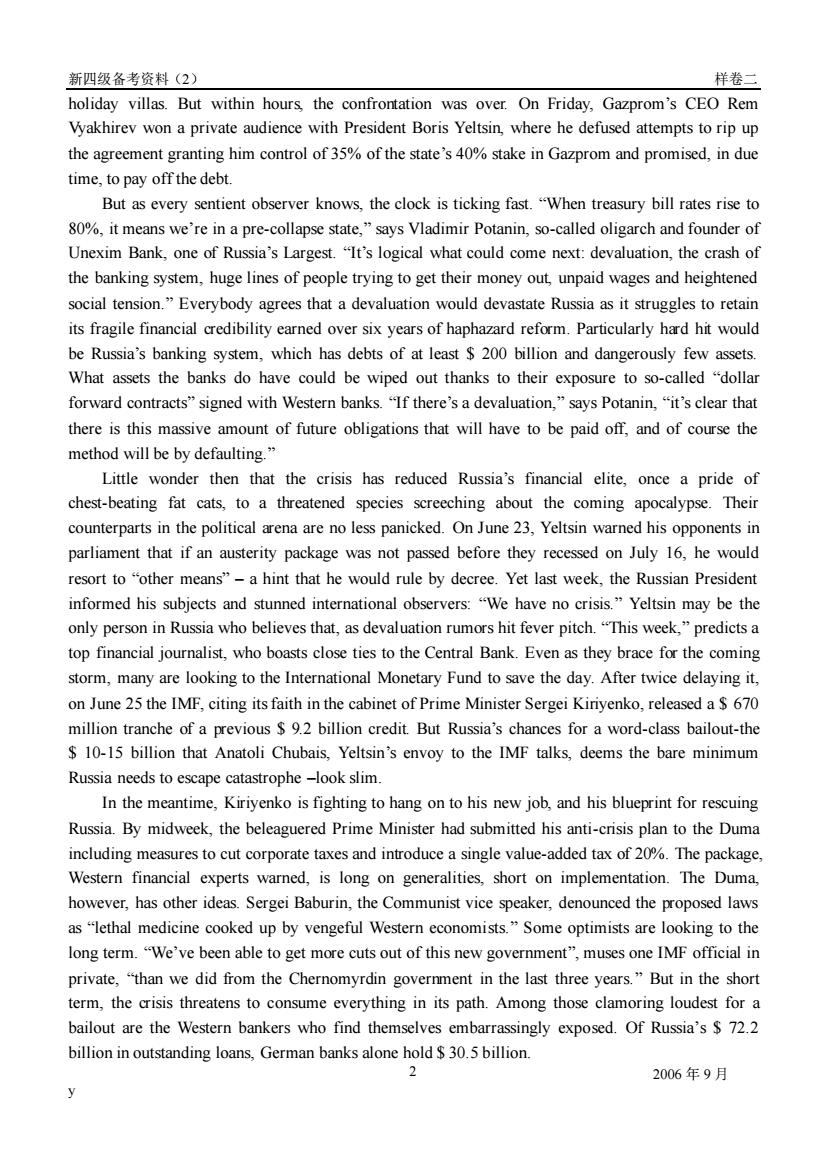
新四级备考资料(2) 样卷二 holiday villas.But within hours the confrontation was over.On Friday,Gazprom's CEO Rem Vyakhirev won a private audience with President Boris Yeltsin,where he defused attempts to rip up the agreement granting him control of 35%of the state's40%stake in Gazprom and promised,in due time,to pay offthe debt. But as every sentient observer knows,the clock is ticking fast."When treasury bill rates rise to %it means we're in a pre-collapse state,"says Vladimir Potanin,so-called oligarch and founder of Unexim Bank,one of Russia's Largest."It's logical what could come next:devaluation,the crash of the banking system,huge lines of people trying to get their money out,unpaid wages and heightened social tension."Everybody agrees that a devaluation would devastate Russia as it struggles to retain its fragile financial redibility earned over six years of haphazard reform.Particularly had hit would be Russia's banking system,which has debts of at least 200 billion and dangerously few assets. What assets the banks do have could be wiped out thanks to their exposure to so-called"dollar forward contracts"signed with Western banks."If there's a devaluation,"says Potanin,"it's clear that there is this massive amount of future obligations that will have to be paid off,and of course the method will be by defaulting." Little wonder then that the crisis has reduced Russia's financial elite,once a pride of chest-beating fat cats,to a threatened species screeching about the coming apocalypse.Their counterparts in the political arena are no less panicked.On June 23.Yeltsin warned his opponents in parliament that if an austerity package was not passed before they recessed on July 16.he would resort to"other means"-a hint that he would rule by decree.Yet last week,the Russian President informed his subjects and stunned international observers:"We have no crisis."Yeltsin may be the only person in Russia who believes that,as devaluation rumors hit fever pitch.This week,"predicts a top financial journalist,who boasts close ties to the Central Bank.Even as they brace for the coming storm,many are looking to the International Monetary Fund to save the day.After twice delaying it, on June 25 the IMF,citing its faith in the cabinet of Prime Minister Sergei Kiriyenko,released as670 million tranche of a previous 9.2 billion credit.But Russia's chances for a word-class bailout-the $10-15 billion that Anatoli Chubais,Yeltsin's envoy to the IMF talks,deems the bare minimum Russia needs to escape catastrophe -look slim. In the meantime.Kiriyenko is fighting to hang on to his new job and his blueprint for rescuing Russia.By midweek,the beleaguered Prime Minister had submitted his anti-crisis plan to the Duma including measures to cut corporate taxes and introduce a single value-added tax of 2%.The package Western financial experts warned,is long on generalities,short on implementation.The Duma, however,has other ideas.Sergei Baburin,the Communist vice speaker,denounced the proposed laws as"lethal medicine cooked up by vengeful Western economists."Some optimists are looking to the long term."We've been able to get more cuts out of this new government"muses one IMF official in private."than we did from the Chernomyrdin government in the last three vears."But in the short term,the risis threatens to consume everything in its path.Among those clamoring loudest for a bailout are the Western bankers who find themselves embarrassingly exposed.Of Russia's 72.2 billion in outstanding loans,German banks alone hold$30.5 billion 2006年9月 y
新四级备考资料(2) 样卷二 2006 年 9 月 y 2 holiday villas. But within hours, the confrontation was over. On Friday, Gazprom’s CEO Rem Vyakhirev won a private audience with President Boris Yeltsin, where he defused attempts to rip up the agreement granting him control of 35% of the state’s 40% stake in Gazprom and promised, in due time, to pay off the debt. But as every sentient observer knows, the clock is ticking fast. “When treasury bill rates rise to 80%, it means we’re in a pre-collapse state,” says Vladimir Potanin, so-called oligarch and founder of Unexim Bank, one of Russia’s Largest. “It’s logical what could come next: devaluation, the crash of the banking system, huge lines of people trying to get their money out, unpaid wages and heightened social tension.” Everybody agrees that a devaluation would devastate Russia as it struggles to retain its fragile financial credibility earned over six years of haphazard reform. Particularly hard hit would be Russia’s banking system, which has debts of at least $ 200 billion and dangerously few assets. What assets the banks do have could be wiped out thanks to their exposure to so-called “dollar forward contracts” signed with Western banks. “If there’s a devaluation,” says Potanin, “it’s clear that there is this massive amount of future obligations that will have to be paid off, and of course the method will be by defaulting.” Little wonder then that the crisis has reduced Russia’s financial elite, once a pride of chest-beating fat cats, to a threatened species screeching about the coming apocalypse. Their counterparts in the political arena are no less panicked. On June 23, Yeltsin warned his opponents in parliament that if an austerity package was not passed before they recessed on July 16, he would resort to “other means” – a hint that he would rule by decree. Yet last week, the Russian President informed his subjects and stunned international observers: “We have no crisis.” Yeltsin may be the only person in Russia who believes that, as devaluation rumors hit fever pitch. “This week,” predicts a top financial journalist, who boasts close ties to the Central Bank. Even as they brace for the coming storm, many are looking to the International Monetary Fund to save the day. After twice delaying it, on June 25 the IMF, citing its faith in the cabinet of Prime Minister Sergei Kiriyenko, released a $ 670 million tranche of a previous $ 9.2 billion credit. But Russia’s chances for a word-class bailout-the $ 10-15 billion that Anatoli Chubais, Yeltsin’s envoy to the IMF talks, deems the bare minimum Russia needs to escape catastrophe –look slim. In the meantime, Kiriyenko is fighting to hang on to his new job, and his blueprint for rescuing Russia. By midweek, the beleaguered Prime Minister had submitted his anti-crisis plan to the Duma including measures to cut corporate taxes and introduce a single value-added tax of 20%. The package, Western financial experts warned, is long on generalities, short on implementation. The Duma, however, has other ideas. Sergei Baburin, the Communist vice speaker, denounced the proposed laws as “lethal medicine cooked up by vengeful Western economists.” Some optimists are looking to the long term. “We’ve been able to get more cuts out of this new government”, muses one IMF official in private, “than we did from the Chernomyrdin government in the last three years.” But in the short term, the crisis threatens to consume everything in its path. Among those clamoring loudest for a bailout are the Western bankers who find themselves embarrassingly exposed. Of Russia’s $ 72.2 billion in outstanding loans, German banks alone hold $ 30.5 billion
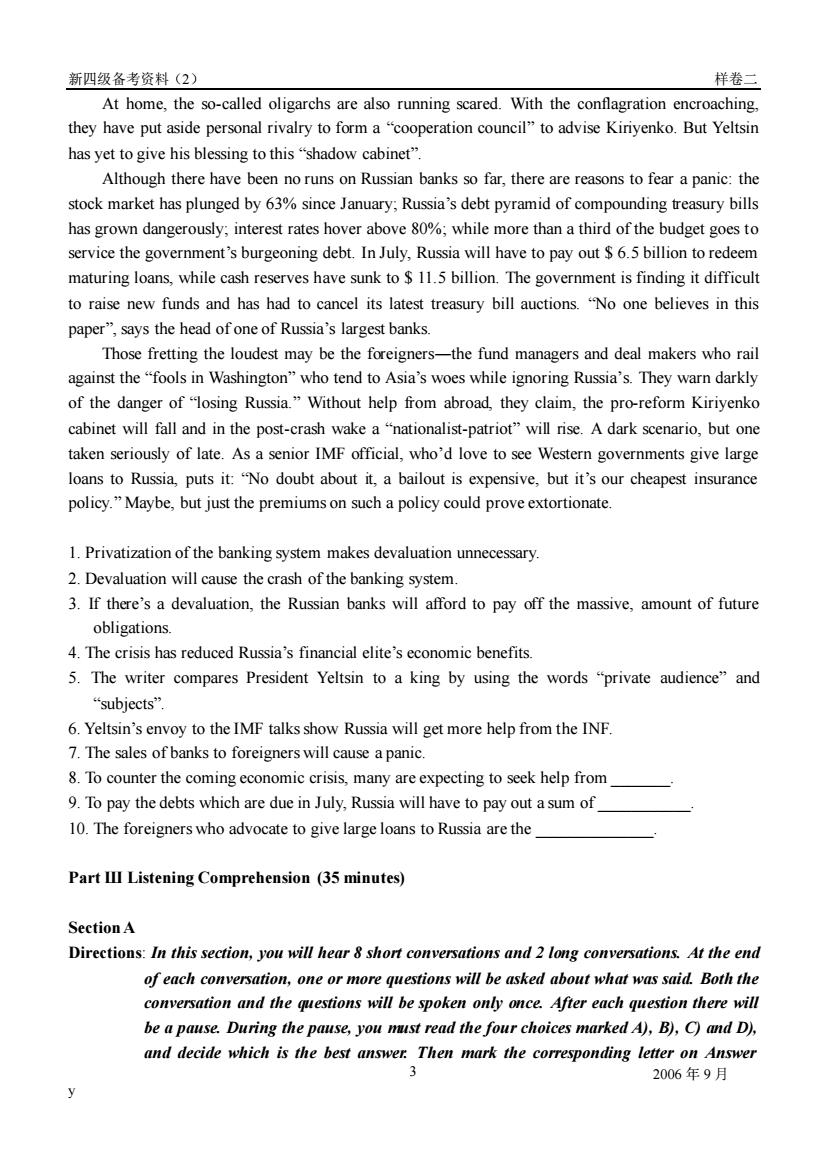
新四级备考资料(2) 样卷三 At home,the so-called oligarchs are also running scared.With the conflagration encroaching they have put aside personal rivalry to form a"cooperation council"to advise Kiriyenko.But Yeltsin has yet to give his blessing to this"shadow cabinet Although there have been no runs on Russian banks so far,there are reasons to fear a panic:the stock market has plunged by63%since January:Russia's debt pyramid of compounding treasury bills has grown dangerously;interest rates hover above 80%;while more than a third of the budget goes to service the government's burgeoning debt.In July,Russia will have to pay out$6.5 billion to redeem maturing loans while cash reserves have sunk to 11 5 billion.The government is finding it difficult to raise new funds and has had to cancel its latest treasury bill auctions."No one believes in this paper",says the head of one of Russia's largest banks. Those fretting the loudest may be the foreigners-the fund managers and deal makers who rai against the"fools in Washington"who tend to Asia's woes while ignoring Russia's.They warn darkly of the danger of"losing Russia"Without help from abroad,they claim,the pro-reform Kiriyenko cabinet will fall and in the post-crash wake a"nationalist-patriot"will rise.A dark scenario,but one taken seriously of late.As a senior IMF official,who'd love to see Western governments give large loans to Russia,puts it:"No doubt about it,a bailout is expensive,but it's our cheapest insurance policy."Maybe,but just the premiumson such a policy could prove extortionate 1.Privatization of the banking system makes devaluation unnecessary. 2.Devaluation will cause the crash of the banking system 3.If there's a devaluation,the Russian banks will afford to pay off the massive,amount of future obligations. 4.The crisis has reduced Russia's financial elite's economic benefits. 5.The writer compares President Yeltsin to a king by using the words "private audience"and “subiects' 6.Yeltsin's envoy to the IMF talks show Russia will get more help from the INF 7.The sales of banks to foreigners will cause a panic. 8.To counter the coming economic crisis,many are expecting to seek help from 9.To pay the debts which are due in July,Russia will have to pay out asum of 10.The foreigners who advocate to give large loans to Russia are the Part II Listening Comprehension (35 minutes) Section A Directions:In this section,you will hear 8 short conversations and 2 long conversations.At the end of each conversation,one or more questions will be asked about what was said.Both the conversation and the questions will be spoken only once.After each question there will be a pause.During the pause,you must read the four choices marked A).B),C)and D). and decide which is the best answer Then mark the corresponding letter on Answer 3 2006年9月
新四级备考资料(2) 样卷二 2006 年 9 月 y 3 At home, the so-called oligarchs are also running scared. With the conflagration encroaching, they have put aside personal rivalry to form a “cooperation council” to advise Kiriyenko. But Yeltsin has yet to give his blessing to this “shadow cabinet”. Although there have been no runs on Russian banks so far, there are reasons to fear a panic: the stock market has plunged by 63% since January; Russia’s debt pyramid of compounding treasury bills has grown dangerously; interest rates hover above 80%; while more than a third of the budget goes to service the government’s burgeoning debt. In July, Russia will have to pay out $ 6.5 billion to redeem maturing loans, while cash reserves have sunk to $ 11.5 billion. The government is finding it difficult to raise new funds and has had to cancel its latest treasury bill auctions. “No one believes in this paper”, says the head of one of Russia’s largest banks. Those fretting the loudest may be the foreigners―the fund managers and deal makers who rail against the “fools in Washington” who tend to Asia’s woes while ignoring Russia’s. They warn darkly of the danger of “losing Russia.” Without help from abroad, they claim, the pro-reform Kiriyenko cabinet will fall and in the post-crash wake a “nationalist-patriot” will rise. A dark scenario, but one taken seriously of late. As a senior IMF official, who’d love to see Western governments give large loans to Russia, puts it: “No doubt about it, a bailout is expensive, but it’s our cheapest insurance policy.” Maybe, but just the premiums on such a policy could prove extortionate. 1. Privatization of the banking system makes devaluation unnecessary. 2. Devaluation will cause the crash of the banking system. 3. If there’s a devaluation, the Russian banks will afford to pay off the massive, amount of future obligations. 4. The crisis has reduced Russia’s financial elite’s economic benefits. 5. The writer compares President Yeltsin to a king by using the words “private audience” and “subjects”. 6. Yeltsin’s envoy to the IMF talks show Russia will get more help from the INF. 7. The sales of banks to foreigners will cause a panic. 8. To counter the coming economic crisis, many are expecting to seek help from _. 9. To pay the debts which are due in July, Russia will have to pay out a sum of _. 10. The foreigners who advocate to give large loans to Russia are the _. Part Ш Listening Comprehension (35 minutes) Section A Directions: In this section, you will hear 8 short conversations and 2 long conversations. At the end of each conversation, one or more questions will be asked about what was said. Both the conversation and the questions will be spoken only once. After each question there will be a pause. During the pause, you must read the four choices marked A), B), C) and D), and decide which is the best answer. Then mark the corresponding letter on Answer
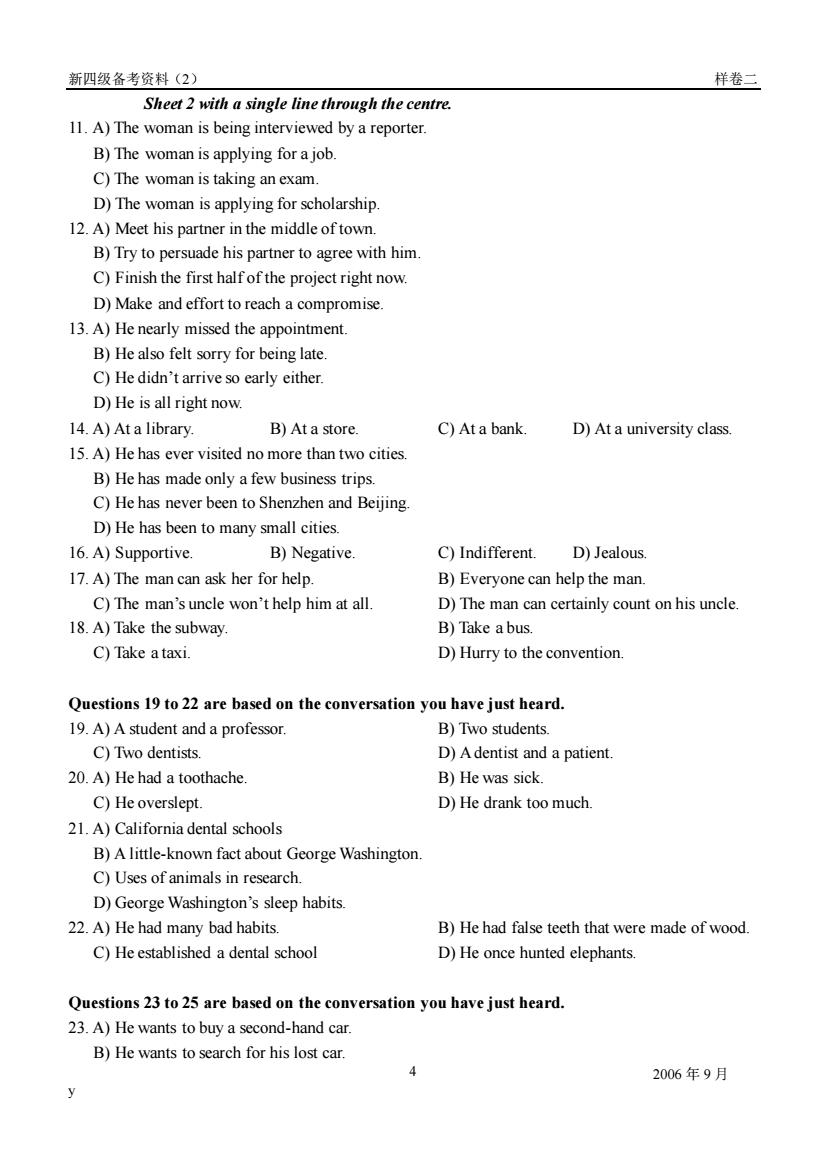
新四级备考资料(2) 样卷二 Sheet 2 with a single line through the centre 11.A)The woman is being interviewed by a reporter. B)The woman is applying for a job C)The woman is taking an exam. D)The woman is applying for scholarship. 12.A)Meet his partner in the middle oftown B)Try to persuade his partner to agree with him C)Finish the first half of the project right now. D)Make and effort to reach a compromise. 13.A)He nearly missed the appointment B)He also felt sorry for being late C)Hedidn'tarrive so early either. D)He is all right now. 14.A)Ata library. B)At a store. C)Ata bank D)At a university class 15.A)He has ever visited no more than two cities. B)He has made only a few business trips. C)He has never been to Shenzhen and Beijing. D)He has been to many small cities. 16.A)Supportive. B)Negative C)Indifferent. D)Jealous. 17.A)The man can ask her for help. B)Everyone can help the man. C)The man's uncle won't help him at all. D)The man can certainly count on his uncle 18.A)Take the subway. B)Take abus. C)Take ataxi. D)Hurry to the convention Questions 19 to 22 are based on the conversation you have just heard. 19.A)A student and a professor. B)Two students. C)Two dentists. D)Adentist and a patient. 20.A)He had a toothache. B)He was sick C)Heoverslept. D)He drank too much 21.A)California dental schools B)A little-known fact about George Washington C)Uses of animals in research. D)George Washington's sleep habits 22.A)He had many bad habits. b)He had false teeth that were made of wood C)Heestablished a dental school D)He once hunted elephants. Questions 23 to 25 are based on the conversation you have just heard 23.A)He wants to buy a second-hand car. B)He wants to search for his lost car 2006年9月
新四级备考资料(2) 样卷二 2006 年 9 月 y 4 Sheet 2 with a single line through the centre. 11. A) The woman is being interviewed by a reporter. B) The woman is applying for a job. C) The woman is taking an exam. D) The woman is applying for scholarship. 12. A) Meet his partner in the middle of town. B) Try to persuade his partner to agree with him. C) Finish the first half of the project right now. D) Make and effort to reach a compromise. 13. A) He nearly missed the appointment. B) He also felt sorry for being late. C) He didn’t arrive so early either. D) He is all right now. 14. A) At a library. B) At a store. C) At a bank. D) At a university class. 15. A) He has ever visited no more than two cities. B) He has made only a few business trips. C) He has never been to Shenzhen and Beijing. D) He has been to many small cities. 16. A) Supportive. B) Negative. C) Indifferent. D) Jealous. 17. A) The man can ask her for help. B) Everyone can help the man. C) The man’s uncle won’t help him at all. D) The man can certainly count on his uncle. 18. A) Take the subway. B) Take a bus. C) Take a taxi. D) Hurry to the convention. Questions 19 to 22 are based on the conversation you have just heard. 19. A) A student and a professor. B) Two students. C) Two dentists. D) A dentist and a patient. 20. A) He had a toothache. B) He was sick. C) He overslept. D) He drank too much. 21. A) California dental schools B) A little-known fact about George Washington. C) Uses of animals in research. D) George Washington’s sleep habits. 22. A) He had many bad habits. B) He had false teeth that were made of wood. C) He established a dental school D) He once hunted elephants. Questions 23 to 25 are based on the conversation you have just heard. 23. A) He wants to buy a second-hand car. B) He wants to search for his lost car
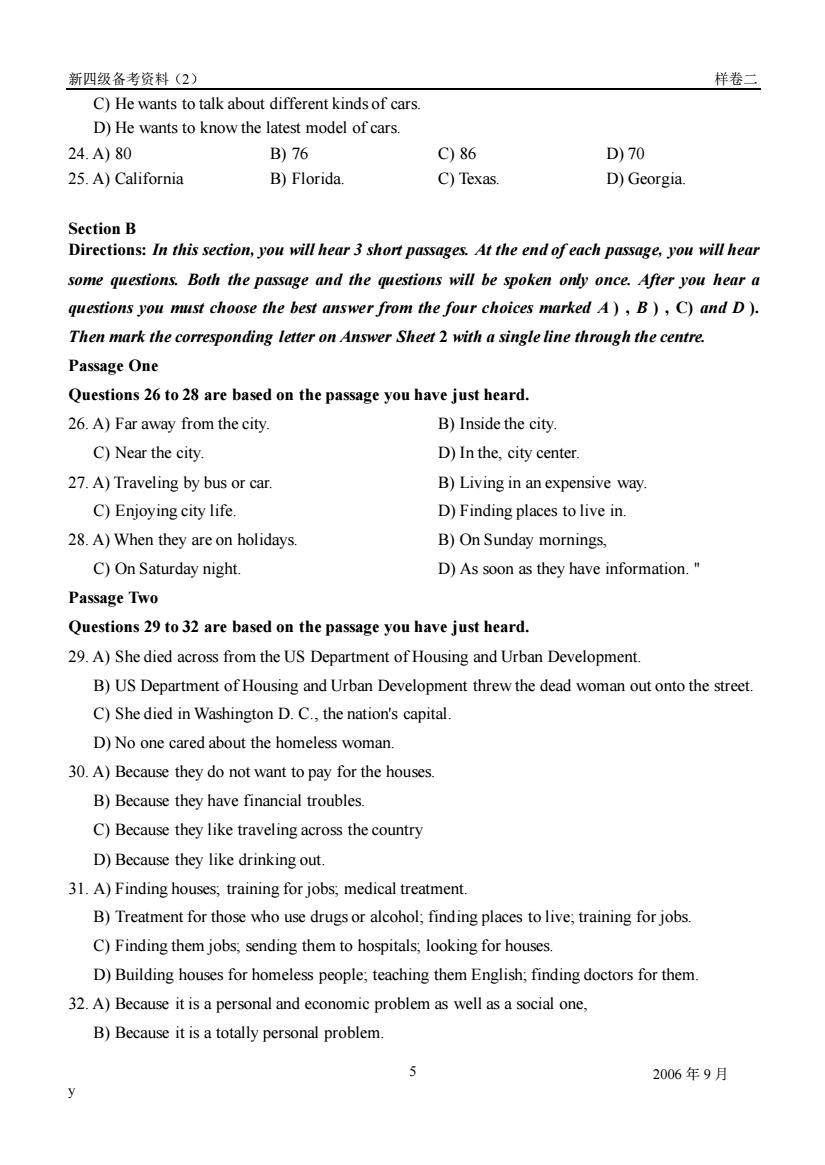
新四级备考资料(2) 样卷三 C)He wants to talk about different kindsof cars D)He wants to know the latest model of cars. 24.A)80 B)76 C)86 D)70 25.A)California B)Florida C)Texas. D)Georgia. Section B Directions:In this section,you will hear 3 short passages.At the end of each passage,you will hear some questions.Both the passage and the questions will be spoken only once.After you hear a questions you must choose the best answer from the four choices marked A),B),C)and D). Then mark the corresponding letter on Answer Sheet 2 with a single line through the centre. Passage One Questions 26 to 28 are based on the passage you have just heard. 26.A)Far away from the city. B)Inside the city. C)Near the city. D)Inthe,city center 27.A)Traveling by bus or car. B)Living in an expensive way. C)Enjoying city life. D)Finding places to live in. 28.A)When they are on holidays B)On Sunday mornings. C)On Saturday night. D)As soon as they have information. Passage Two Questions 29 to32 are based on the passage you have just heard. 29.A)She died across from the US Department of Housing and Urban Development. B)US Department of Housing and Urban Development threw the dead woman out onto the street. C)She died in Washington D.C.,the nation's capital. D)No one cared about the homeless woman. 30.A)Because they do not want to pay for the houses. B)Because they have financial troubles. C)Because they like traveling across the country D)Because they like drinking out 31.A)Finding houses,training for jobs,medical treatment. B)Treatment for those who use drugsor alcohol;finding places to live;training for jobs C)Finding them jobs,sending them to hospitals,looking for houses D)Building houses for homeless people;teaching them English;finding doctors for them. 32.A)Because it is a personal and economic problem as well as a social one. B)Because it is a totally personal problem. 2006年9月
新四级备考资料(2) 样卷二 2006 年 9 月 y 5 C) He wants to talk about different kinds of cars. D) He wants to know the latest model of cars. 24. A) 80 B) 76 C) 86 D) 70 25. A) California B) Florida. C) Texas. D) Georgia. Section B Directions: In this section, you will hear 3 short passages. At the end of each passage, you will hear some questions. Both the passage and the questions will be spoken only once. After you hear a questions you must choose the best answer from the four choices marked A ) , B ) , C) and D ). Then mark the corresponding letter on Answer Sheet 2 with a single line through the centre. Passage One Questions 26 to 28 are based on the passage you have just heard. 26. A) Far away from the city. B) Inside the city. C) Near the city. D) In the, city center. 27. A) Traveling by bus or car. B) Living in an expensive way. C) Enjoying city life. D) Finding places to live in. 28. A) When they are on holidays. B) On Sunday mornings, C) On Saturday night. D) As soon as they have information. " Passage Two Questions 29 to 32 are based on the passage you have just heard. 29. A) She died across from the US Department of Housing and Urban Development. B) US Department of Housing and Urban Development threw the dead woman out onto the street. C) She died in Washington D. C., the nation's capital. D) No one cared about the homeless woman. 30. A) Because they do not want to pay for the houses. B) Because they have financial troubles. C) Because they like traveling across the country D) Because they like drinking out. 31. A) Finding houses; training for jobs; medical treatment. B) Treatment for those who use drugs or alcohol; finding places to live; training for jobs. C) Finding them jobs; sending them to hospitals; looking for houses. D) Building houses for homeless people; teaching them English; finding doctors for them. 32. A) Because it is a personal and economic problem as well as a social one, B) Because it is a totally personal problem